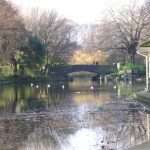Sitting one day on a park bench in Saint Stephen’s Green, there was a lesson in international politics.
Armed with a tuna baguette and a bar of chocolate for lunch, the mostly deserted park benches offered opportunity to sit and escape. Across the pond a mother pushed her little boy in one of those three wheeled buggies. Stopping near the water’s edge, she handed bread to the boy who threw pieces of it around him. The birds began to swarm: mallard ducks swam across the water, pigeons in their dozens came swooping in, even a pair of swans swam serenely to the scene to investigate the possibilities. The effort for all but a few of them was pointless, the chunks of bed were quickly gone.
There seemed a lesson there about economics, maybe about not chasing markets that were already overcrowded, though teaching theories of supply and demand to grey pigeons would probably not be very fruitful.
A few gulls drifted aimlessly in the pond, apparently oblivious to the furious activity of the pigeons. Eventually one hopped out of the water and walked towards the bench; a large herring gull, who seemed as big as two of the mallard, he came and stood five yards from the bench and just stared fixedly.
Mind games, huh? Two can play at that. The baguette was very good, tuna and cranberries and salad, its taste unaffected by the presence of a large gull at five strides’ distance. Finally, there was just bread left at the end. The bird looked expectantly and leapt with delight as the two hunks of bread landed on the grass. Both were gone in seconds, not even a crumb left for the pigeons.
The herring gull seemed vindication of the thought about not following the crowd, he had gone his own way and made his own chances. The basis of the gull’s policy became clear, he simply chased away any other bird that trespassed on his length of the water’s edge. This gull was not an entrepreneur finding new sources of income, this gull was a monopolist, he was a bully.
One could devise an entire economic model based on pigeons and gulls, after all, it would be no more silly and probably far less calamitous than the economic model that has bankrupted the country. More than that, one could base one’s political analysis on a model where many chase after a few crumbs while the strong and powerful simply enforce their will.
In a European Union where Ireland is just 1% of the population, to hope that policy might be in our interests is like a pigeon expecting that everything else will stand back and let it eat alone, except were not on the scale of a pigeon against a herring gull sized Germany, we’re not even the size of a wren. The German chancellor can strut around with an air as dismissive as a Dublin herring gull and there is not a thing we can do about it.
